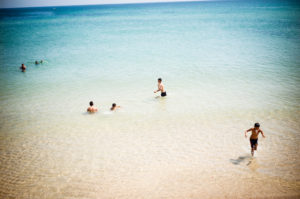 Summer in Oregon has finally arrived! After such a long winter I know we are all ready to get out and enjoy the sun. With skin cancer on the rise it is important to keep sun play safe. We know that sunburns before the age of 18 can greatly increase the risk of skin cancer later in life. Here are a few tips for keeping your kids safe when it comes to sun exposure.
Summer in Oregon has finally arrived! After such a long winter I know we are all ready to get out and enjoy the sun. With skin cancer on the rise it is important to keep sun play safe. We know that sunburns before the age of 18 can greatly increase the risk of skin cancer later in life. Here are a few tips for keeping your kids safe when it comes to sun exposure.
- For children 0-6 months limit time in the sun to 20 minutes. Make sure to use wide brimmed hats and long-sleeved bathing suits for this age range as well. It is best to avoid sunscreen use before 6 months. Avoid sun exposure between 10 and 4 pm when the UV are most intense.
- For children 6 months and up look for sunscreens containing zinc oxide that are SPF 30. This is the stuff that lifeguards put on their nose and is the most protective and has the least amount of chemical additives. For the best protection do not rub in completely. Make sure to reapply every 1-2 hours and after water-play. Here are a few great options:
- The sun can also be very damaging for the eyes. So have fun finding some cute kids’ sunglasses for your little one!
- A diet rich in antioxidants is also very protective against free radicals formed by sun exposure. So feel free to let your kids indulge on berries all summer long!
Even with our best efforts sunburns still occur sometimes. Here are some tips for treating sunburns in kids:
- Apply calendula cream or ointment to burn 2-3 times daily.
- Topical aloe gel can help soothe the burn.
- More berries! Keep up with those antioxidants to continue to combat free radicals.
- Avoid further sun exposure until the burn heals.
- Contact your doctor if blistering occurs.
Reference:
https://www.cdc.gov/cancer/skin/basic_info/children.htm

